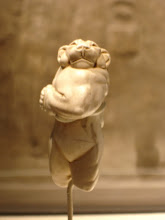Just got out of the live HD transmission of the Metropolitan Opera's production of Hector Berlioz's "Damnation of Faust." It was staged by the well-known director Robert Lepage, his first work for the Met, and beautifully sung, especially by the baritone singing Mephistopheles, John Relyea.
Lepage filled this episodic opera with fabulous visual tricks illustrating the hallucinatory imagery in the score, imagery which certainly seems to suggest that Berlioz was a drug fiend, as has been rumored. Snakelike, writhing trees, demons dropping from the skies to cavort with will of the wisps, a grid-like scaffolding enabling two planes of projection.
But after all this fertile creativity, the final scene, in which Faust is dragged down to Hell and his betrayed lover, Marguerite, literally ascends a ladder toward Heaven, is pure stereotype. I had to smile to think that only days ago I wrote in this blog about the hierarchy of Heaven. Here you had the barechested damned, all male and visible only from the waist up at the very bottom of the stage, suddenly replaced in a twinkling by a chorus consisting entirely of women and children and dressed all in white drapery, so many angels. And right at their center Marguerite, also decked out in a white robe, climbing the celestial ladder.
The music was sublime, but the visuals at the climax were all too expected. And as I gazed at this antiseptic scene of Marguerite's supposed redemption, I remembered my own words from an essay I wrote right after 9/11:
"Now, paradise or heaven has never appealed to me. From my childhood, I remember our Lutheran minister awkwardly trying to conjure up the delights of this place (Lutherans are better at duty and order than at poetic description). I also digested the more fluid prose of Catholic priests while staying with friends. However, and however well, it was described, paradise sounded dreadfully boring. Floating around playing harps and singing praises to God "up there," a never-ending so-called "life" without any of the delights of embodiment: nothing to tempt me. Plus, I've never been fond of hierarchy, and every mainstream religion with an afterlife concept features one that's cast in stone, with God (by whatever name) at the top, saints, cherubim and seraphim of whichever description near the top and, of course, the vast majority of folks (and just about all women) permanently at the bottom, and supposed to be grateful to be there. Thanks, but no thanks."
You can tell that my opinion about the afterlife has been pretty constant for some time. Pagans in general don't believe in "heaven" or "hell": in my own case, unlike many of my fellow Pagans, I don't subscribe to reincarnation either, or to the comforting concept of a "Summerland," where souls wait contentedly to return to this world. As I put it in the same earlier essay,
"My thoughts run like this: when I die, my energy will get "recycled" into other forms of life. Maybe my ashes will fertilize some plants! But my common sense doesn't accept the idea that any entity recognizable as uniquely "me" will endure, or return. And I don't feel in any way disappointed or cheated by that. I must admit that to me, it seems greedy to demand more than one lifespan, as if living in itself were not a treasure beyond price for those of us lucky enough to be living in relatively comfortable circumstances in relatively enlightened parts. Instead, we could be making the most of every moment we are given, dealing with our limitations, celebrating our possibilities, and fighting to improve everything we can. As the late great Margaret Mead put it, 'Never doubt that a small group of thoughtful, committed citizens can change the world; indeed, it's the only thing that ever does.'
"So my concept of an "afterlife" is that life on earth will go on after I'm dead. I don't have children of my own, and it doesn't trouble me to think that my particular genetic code stops here. I have a lot of children and young people to care about, including large numbers I don't know personally. I see the well-being of all the creatures of our Earth, present and future, as the legacy, the re-cycling, as it were, of my energy and that of uncounted thousands upon thousands of others, human and non-human. Our mission, if we choose to accept it -- and it's a glorious one -- is to spend our time enjoying each other's company, making the most of the talents we have and doing our level best to each safeguard our little corner of the Earth from the uncontrolled depredations of the human race and keep that human race from making itself extinct. It does no one any good if we lose our time grumbling, moaning and trembling, or fixating on being "raptured" away to a rigidly ranked hereafter.
"I suggest we stop betting our present lives on a non-existent future one. Let's not hate ourselves any longer, let's not deny ourselves the beauty and happiness of mortal existence for fear of post-mortem punishment for being human. And let's not accept the unacceptable over and over, here and now, on the assumption that some pre-programmed variety of bliss lies beyond death's door. It's a bad bargain: for us, for the planet, for all the living beings that will be birthed in the time to come."
Saturday, November 22, 2008
Subscribe to:
Post Comments (Atom)

No comments:
Post a Comment